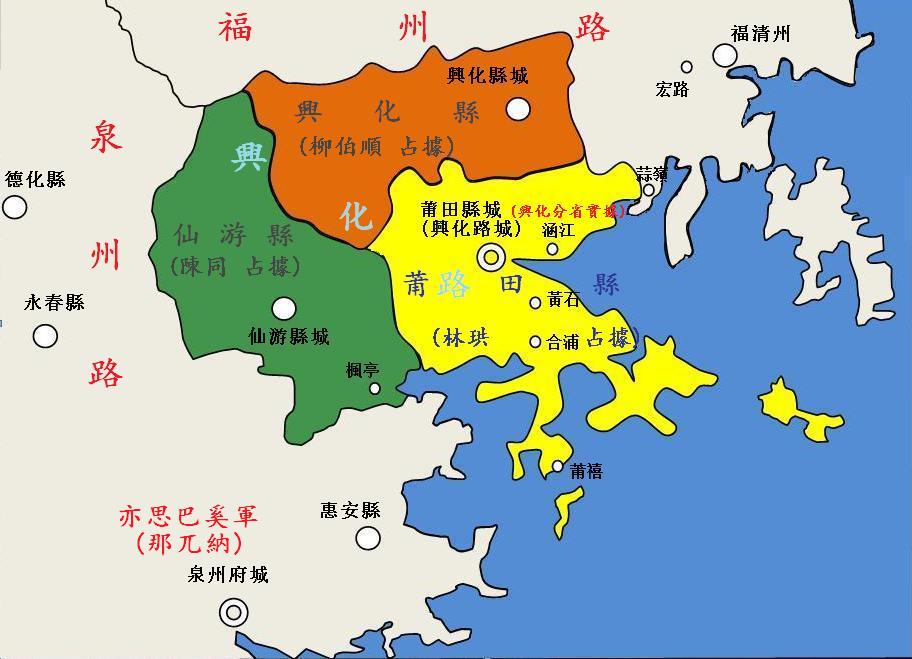|
Ispah Rebellion
The Ispah rebellion () were a series of civil wars in the middle of 14th century in Fujian during the Yuan dynasty. The term Ispah might derive from the Persian word "سپاه" (''sepâh''), meaning "army" or " Sepoy". Thus, the rebellion is also known as the Persian Sepoy rebellion (波斯戍兵之亂; ''Bōsī Shùbīng zhī Luàn'') in Chinese documents. Under Yuan rule, more Semu people (Arab and Persian Muslims) migrated to the Chinese port city of Quanzhou. In 1357, a predominantly Muslim army led by two Quanzhou Muslims, Sayf ad-Din () and Amir ad-Din (), revolted against the Yuan. The rebel army seized control of Quanzhou, Putian, and even reached the provincial capital Fuzhou. In 1362, the Ispah army collapsed into internal conflict. In 1366, it was eventually crushed by the ethnic Han commander Chen Youding ( 陈友定) who was loyal to the Yuan dynasty. Historical background From the 13th century to the early 14th century in the Yuan dynasty, overseas trade was ext ... [...More Info...] [...Related Items...] OR: [Wikipedia] [Google] [Baidu] |
Fujian
Fujian (; alternately romanized as Fukien or Hokkien) is a province on the southeastern coast of China. Fujian is bordered by Zhejiang to the north, Jiangxi to the west, Guangdong to the south, and the Taiwan Strait to the east. Its capital is Fuzhou, while its largest city by population is Quanzhou, both located near the coast of the Taiwan Strait in the east of the province. While its population is predominantly of Chinese ethnicity, it is one of the most culturally and linguistically diverse provinces in China. The dialects of the language group Min Chinese were most commonly spoken within the province, including the Fuzhou dialect of northeastern Fujian and various Hokkien dialects of southeastern Fujian. Hakka Chinese is also spoken, by the Hakka people in Fujian. Min dialects, Hakka and Mandarin Chinese are mutually unintelligible. Due to emigration, a sizable amount of the ethnic Chinese populations of Taiwan, Singapore, Malaysia, Indonesia, and the Philippines ... [...More Info...] [...Related Items...] OR: [Wikipedia] [Google] [Baidu] |
Sunni
Sunni Islam () is the largest branch of Islam, followed by 85–90% of the world's Muslims. Its name comes from the word '' Sunnah'', referring to the tradition of Muhammad. The differences between Sunni and Shia Muslims arose from a disagreement over the succession to Muhammad and subsequently acquired broader political significance, as well as theological and juridical dimensions. According to Sunni traditions, Muhammad left no successor and the participants of the Saqifah event appointed Abu Bakr as the next-in-line (the first caliph). This contrasts with the Shia view, which holds that Muhammad appointed his son-in-law and cousin Ali ibn Abi Talib as his successor. The adherents of Sunni Islam are referred to in Arabic as ("the people of the Sunnah and the community") or for short. In English, its doctrines and practices are sometimes called ''Sunnism'', while adherents are known as Sunni Muslims, Sunnis, Sunnites and Ahlus Sunnah. Sunni Islam is sometimes referre ... [...More Info...] [...Related Items...] OR: [Wikipedia] [Google] [Baidu] |
Islamic
Islam (; ar, ۘالِإسلَام, , ) is an Abrahamic monotheistic religion centred primarily around the Quran, a religious text considered by Muslims to be the direct word of God (or '' Allah'') as it was revealed to Muhammad, the main and final Islamic prophet.Peters, F. E. 2009. "Allāh." In , edited by J. L. Esposito. Oxford: Oxford University Press. . (See alsoquick reference) " e Muslims' understanding of Allāh is based...on the Qurʿān's public witness. Allāh is Unique, the Creator, Sovereign, and Judge of mankind. It is Allāh who directs the universe through his direct action on nature and who has guided human history through his prophets, Abraham, with whom he made his covenant, Moses/Moosa, Jesus/Eesa, and Muḥammad, through all of whom he founded his chosen communities, the 'Peoples of the Book.'" It is the world's second-largest religion behind Christianity, with its followers ranging between 1-1.8 billion globally, or around a quarter of the world's po ... [...More Info...] [...Related Items...] OR: [Wikipedia] [Google] [Baidu] |
Ethnic Diversity
The term multiculturalism has a range of meanings within the contexts of sociology, political philosophy, and colloquial use. In sociology and in everyday usage, it is a synonym for " ethnic pluralism", with the two terms often used interchangeably, and for cultural pluralism in which various ethnic groups collaborate and enter into a dialogue with one another without having to sacrifice their particular identities. It can describe a mixed ethnic community area where multiple cultural traditions exist (such as New York City or London) or a single country within which they do (such as Switzerland, Belgium or Russia). Groups associated with an indigenous, aboriginal or autochthonous ethnic group and settler-descended ethnic groups are often the focus. In reference to sociology, multiculturalism is the end-state of either a natural or artificial process (for example: legally-controlled immigration) and occurs on either a large national scale or on a smaller scale within a nation's ... [...More Info...] [...Related Items...] OR: [Wikipedia] [Google] [Baidu] |
Hinduism
Hinduism () is an Indian religion or '' dharma'', a religious and universal order or way of life by which followers abide. As a religion, it is the world's third-largest, with over 1.2–1.35 billion followers, or 15–16% of the global population, known as Hindus. The word ''Hindu'' is an exonym, and while Hinduism has been called the oldest religion in the world, many practitioners refer to their religion as '' Sanātana Dharma'' ( sa, सनातन धर्म, lit='the Eternal Dharma'), a modern usage, which refers to the idea that its origins lie beyond human history, as revealed in the Hindu texts. Another endonym is ''Vaidika dharma'', the dharma related to the Vedas. Hinduism is a diverse system of thought marked by a range of philosophies and shared concepts, rituals, cosmological systems, pilgrimage sites, and shared textual sources that discuss theology, metaphysics, mythology, Vedic yajna, yoga, agamic rituals, and temple building, among other to ... [...More Info...] [...Related Items...] OR: [Wikipedia] [Google] [Baidu] |
Manichaeism
Manichaeism (; in New Persian ; ) is a former major religionR. van den Broek, Wouter J. Hanegraaff ''Gnosis and Hermeticism from Antiquity to Modern Times''SUNY Press, 1998 p. 37 founded in the 3rd century AD by the Parthian Empire, Parthian prophet Mani (prophet), Mani (AD 216–274), in the Sasanian Empire. Manichaeism teaches an elaborate dualistic cosmology describing the conflict between good and evil, struggle between a goodness and value theory, good, spirituality, spiritual world of light, and an evil, material world of darkness. Through an ongoing process that takes place in human history, light is gradually removed from the world of matter and returned to the world of light, whence it came. Its beliefs are based on local Mesopotamian religious movements and Gnosticism. It reveres Mani as the final prophet after Zoroaster, Gautama Buddha, and Jesus. Manichaeism was quickly successful and spread far through the Aramaic language, Aramaic-speaking regions. It thrived be ... [...More Info...] [...Related Items...] OR: [Wikipedia] [Google] [Baidu] |
Christianity
Christianity is an Abrahamic monotheistic religion based on the life and teachings of Jesus of Nazareth. It is the world's largest and most widespread religion with roughly 2.38 billion followers representing one-third of the global population. Its adherents, known as Christians, are estimated to make up a majority of the population in 157 countries and territories, and believe that Jesus is the Son of God, whose coming as the messiah was prophesied in the Hebrew Bible (called the Old Testament in Christianity) and chronicled in the New Testament. Christianity began as a Second Temple Judaic sect in the 1st century Hellenistic Judaism in the Roman province of Judea. Jesus' apostles and their followers spread around the Levant, Europe, Anatolia, Mesopotamia, the South Caucasus, Ancient Carthage, Egypt, and Ethiopia, despite significant initial persecution. It soon attracted gentile God-fearers, which led to a departure from Jewish customs, and, a ... [...More Info...] [...Related Items...] OR: [Wikipedia] [Google] [Baidu] |
Islam
Islam (; ar, ۘالِإسلَام, , ) is an Abrahamic religions, Abrahamic Monotheism#Islam, monotheistic religion centred primarily around the Quran, a religious text considered by Muslims to be the direct word of God in Islam, God (or ''Allah'') as it was revealed to Muhammad, the Muhammad in Islam, main and final Islamic prophet.Peters, F. E. 2009. "Allāh." In , edited by J. L. Esposito. Oxford: Oxford University Press. . (See alsoquick reference) "[T]he Muslims' understanding of Allāh is based...on the Qurʿān's public witness. Allāh is Unique, the Creator, Sovereign, and Judge of mankind. It is Allāh who directs the universe through his direct action on nature and who has guided human history through his prophets, Abraham, with whom he made his covenant, Moses/Moosa, Jesus/Eesa, and Muḥammad, through all of whom he founded his chosen communities, the 'Peoples of the Book.'" It is the Major religious groups, world's second-largest religion behind Christianity, w ... [...More Info...] [...Related Items...] OR: [Wikipedia] [Google] [Baidu] |
Ethnic Enclave
In sociology, an ethnic enclave is a geographic area with high ethnic concentration, characteristic cultural identity, and economic activity. The term is usually used to refer to either a residential area or a workspace with a high concentration of ethnic firms.Portes, Alejandro, and Leif Jensen. "Disproving the Enclave Hypothesis: Reply." ''American Sociological Review''. Vol. 57. no. 3 (1992): 418-420. Their success and growth depends on self-sufficiency, and is coupled with economic prosperity. The theory of social capital and the formation of migrant networks creates the social foundation for ethnic enclaves. Douglas Massey describes how migrant networks provide new immigrants with social capital that can be transferred to other tangible forms.Massey, Douglas S. "Annals of the American Academy of Political and Social Science." Annals of the American Academy of Political and Social Science. Vol. 510. World Population: Approaching the Year 2000 (Jul., 1990): pp. 60. As immigran ... [...More Info...] [...Related Items...] OR: [Wikipedia] [Google] [Baidu] |
Armenians
Armenians ( hy, հայեր, ''hayer'' ) are an ethnic group native to the Armenian highlands of Western Asia. Armenians constitute the main population of Armenia and the ''de facto'' independent Artsakh. There is a wide-ranging diaspora of around five million people of full or partial Armenian ancestry living outside modern Armenia. The largest Armenian populations today exist in Russia, the United States, France, Georgia, Iran, Germany, Ukraine, Lebanon, Brazil, and Syria. With the exceptions of Iran and the former Soviet states, the present-day Armenian diaspora was formed mainly as a result of the Armenian genocide. Richard G. Hovannisian, ''The Armenian people from ancient to modern times: the fifteenth century to the twentieth century'', Volume 2, p. 421, Palgrave Macmillan, 1997. Armenian is an Indo-European language. It has two mutually intelligible spoken and written forms: Eastern Armenian, today spoken mainly in Armenia, Artsakh, Iran, and the former Soviet ... [...More Info...] [...Related Items...] OR: [Wikipedia] [Google] [Baidu] |
Tamils
The Tamil people, also known as Tamilar ( ta, தமிழர், Tamiḻar, translit-std=ISO, in the singular or ta, தமிழர்கள், Tamiḻarkaḷ, translit-std=ISO, label=none, in the plural), or simply Tamils (), are a Dravidian ethno-linguistic group who trace their ancestry mainly to India’s southern state of Tamil Nadu, union territory of Puducherry and to Sri Lanka. Tamils who speak the Tamil Language and are born in Tamil clans are considered Tamilians. Tamils constitute 5.9% of the population in India (concentrated mainly in Tamil Nadu and Puducherry), 15% in Sri Lanka (excluding Sri Lankan Moors), 7% in Malaysia, 6% in Mauritius, and 5% in Singapore. From the 4th century BCE, urbanisation and mercantile activity along the western and eastern coasts of what is today Kerala and Tamil Nadu led to the development of four large Tamil empires, the Cheras, Cholas, Pandyas, and Pallavas and a number of smaller states, all of whom were warring amongst ... [...More Info...] [...Related Items...] OR: [Wikipedia] [Google] [Baidu] |



.jpg)



